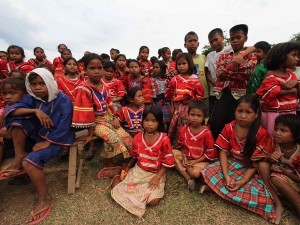Bringing education to Manobo kids

IF THESE Manobo children can’t go to school, then the school will come to them. PHOTO COURTESY OF SATMI
TALAINGOD, Compostela Valley—Accessible only by a customized dirt bike called “habal-habal,” which can maneuver dangerous and muddy dirt roads, the Manobo tribal village of Palma Gil in the town of Talaingod is an isolated place.
The nearest government elementary and high schools are kilometers away from the tribal village and going to these schools will cost P500 per day in transportation fare.
Fortunately, an indigenous people’s school sponsored by Rural Missionaries of the Philippines (RMP) was established in the village. Teachers brave the treacherous routes going to the school and stay there every school year without access to electricity and mobile phone signal.
The school, Salugpungan Ta Tanu Igkanugon Community Learning Center, has six classrooms and serves Grade 1 to Grade 6 pupils.
The academic year 2012-2013 is special for the tribal people and the teachers because they are producing the first batch of graduates in the village.
Article continues after this advertisementPoverty level
Article continues after this advertisementConsidered as one of the most impoverished municipalities in Mindanao, Talaingod has witnessed the Manobo tribe’s decades of struggle for the preservation of its ancestral land.
According to the 2009 Small Area Estimates of poverty conducted by the World Bank and the National Statistical Coordination Board, Talaingod is the fifth poorest municipality in the Davao Region with a 62.6-percent poverty incidence rate.
Datu Alobo Bago, one of the tribal chieftains in Talaingod, said the school is a symbol of the unity of the different tribal communities in their desire to provide better lives for future generations.
Storm destruction
“I am thankful that RMP and their teachers brought this school to our village. This is a huge help considering that government services rarely reach our communities. We are hopeful that education is the solution to our poverty. If our children are educated then big companies and politicians will not be able to fool us and use us,” Bago said.
However, their optimism was tested when Typhoon “Pablo” devastated Mindanao. The homes of the tribal people were blown away by strong winds. The school, which is their beacon of hope, was also destroyed.
At least 569 schools and 2,500 classrooms were damaged in the disaster, leaving more than 200,000 children without classrooms. These figures add up to the shortage in school facilities, which is beleaguering the country’s educational system.
“I thought I will not be able to step into Grade 3 anymore. My life will be shattered if I will not be able to continue my education because our school is our hope,” said 8-year-old Joan after surviving the killer typhoon.
But the community is determined to build a better future for the children. Aside from rebuilding their homes, the tribal people worked together to rebuild their school and ensure that the first graduation in the community pushes through.
Sources of help
Various sponsors from the United States, including the United Methodist Church, Bayan affiliates and other organizations funded the rehabilitation of the school. The initiatives were coursed through RMP, Fr. Fausto Tentorio Foundation and Balsa Mindanao. In March this year, at least 20 students graduated in a simple ceremony in the mountains of Talaingod.
And despite the trials that the people faced during Typhoon Pablo, the community was able to build a classroom for their very first high school in the village.
Yesterday, at least 34 foreign missionaries and Filipino-American youth traversed through dirt roads to reach the tribal communities to continue the mission of delivering social services.
The group provided medical and psychosocial services in several communities in Talaingod and Compostela town, which are rarely reached by relief and rehabilitation services.
New schools
Aside from the medical mission, the group also helped in the building of 24 new community schools in mountain areas affected by Typhoon Pablo in Davao del Norte, Compostela Valley and Davao Oriental.
The Redemptorists’ Saint Alphonsus’ Theological and Mission Institute, through Fr. Caloy Ronquillo, also donated two classrooms made of hardwood in a tribal community in Compostela town.
The group also opened community and school farms, built nurseries and planted fruit trees.
Kuusela Hilo, of International League of People’s Struggle-USA, said the international mission in Mindanao is an expression of solidarity with the survivors of the storm who are trying to rebuild their lives.
“We are blessed and honored to be here from the United States in unity with the people of Mindanao who continue to unite and struggle to rebuild their lives and realize their dreams,” Hilo said.
Urge to help
Pastor Frank Wulf, of United Methodist Church California-Pacific Conference, said when they heard about Typhoon Pablo they immediately felt the need for them to reach out and help the communities.
“Our immediate reaction was to raise money for relief,” Wulf said.
But Wulf explained that sending relief is not the only thing that matters.
“We should begin to deal with the issues that caused this devastation, including the political, economic and social factors. We felt committed to be more involved in solving the root cause of the problem,” Wulf said.